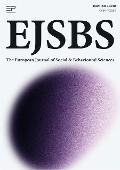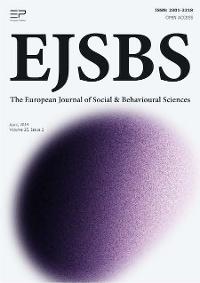Abstract
This paper focuses on the associations of the selected elements of academic self-concept among entry level academic staff which contribute to building their professional self-concept. The study investigated the question whether a positive correlation exists among selected elements of academic self-concept among the research sample. The main aim of the study was to analyse associations among motivational beliefs, self-efficacy, metacognitive strategies and meaningfulness of studies as elements influencing the learning autoregulation of respondents which would contribute to the development of academic self-concept. The research methods included the implementation of the standardized questionnaire DAUS (Hrbáčková, 2011) comprising 40 items divided into four groups that respondents’ rate according to a seven-point scale, from "1 – I totally disagree" to "7 - I fully agree," with 4 meaning "difficult to decide". The results reveal positive associations among academic self-concept elements, but these associations differ in terms of countries. It can be concluded that the strongest correlation is between meaningfulness of studies and motivational beliefs.
Keywords: Beginning academic workers, self-concept, correlations
Introduction
The professional self-concept of the entry level academic staff or academic staff who are starting their careers as future university teachers and researchers and therefore, the bearers of leading societal values, can be reflected in the development of a few important roles: mentors of learning, knowledge leaders, leaders of the education community, assessors of the current state of knowledge, and models for students in creating their professional self-concept. The formation of professional self-concept is mainly based not only on the interactions with significant others (supervisors or mentors) and developing the network of informational sources in terms of academic roles in the process of socialization, but mostly on their own initiative to immerse themselves into the researched problematics which demands the development of a mature approach to study the related materials and process the information. Based on previous research definitions (Wiegerová et al., 2013), we define an entry level academic staff as a novice researcher and a university teacher, who can be a master's degree student, a doctoral student and a post-doctoral student at the beginning of a professional career and whose position is influenced not only by the conditions for his/her professional growth at individual universities, but also by the values and personal constructs forming self-concept (Wiegerová, 2016).
Self-concept is created in the process of socialization (Helus, 2011) and can be defined as an idea of ourselves, which involves cognitive, sensory and emotional factors. To explain the behavior and performance in relation to the work environment has become a subject of research in many western European countries (Bong & Skaalvik, 2003; Ghazvini, 2011; Kelchtermans, 1993; Puente-Palacios & Souza, 2018; Schunk, 1991). The above-mentioned scientists relied on psychological studies to define self-concept and its individual components, for example by Higgins (1987), Markus and Wurf (1987) or Bandura (1997).
For the purpose of this research, our definition of professional self-concept is based on the traditional conception of Marsh and Shavelson (2010), which defines self-concept as a personal perception of ourselves based on our experience and environment interpretation. Their model depicts self-concept as multifaceted and hierarchically organized. According to them, self-concept can be divided into academic, social, emotional, and physical aspects. It is the academic self-concept that seems to be a very frequent subject of quantitative research in self-regulation.
Academic self-concept is the idea of our academic abilities and directly influences our learning process, academic achievement, and the expectations we have from our studying. This self-concept further helps to create cognitive and self-regulatory strategies, which are directly reflected in the academic performance (Ghazvini, 2011). According to Ordaz-Villegaz, Acle-Tomasini, & Reyes-Lagunes (2014), the global framework of academic self–concept includes general academic dimensions such as intellectual abilities, specific intellectual abilities, motivation, creativity, and self-regulation.
Regarding the long-term preparation of the doctoral students for their academic profession based on the independent approach to study, which certainly demands a regulated effort, the research focuses on doctoral students' self-regulation of study.
Self-regulation of learning can be perceived as the management of one's own learning. It can be considered as a kind of "meta-knowledge"; that means the knowledge of how one learns, but also what motives lead us to some actions (Hrbáčková, 2009). The learning itself contributes, in the case of doctoral students, in the development of the personality and the acquisition of self-confidence, new experience, overcoming obstacles and the feeling of well-done work. In the case of this study, the success in overcoming obstacles and motivation formulated by the respondents most often as "proof that I can do it" is the cause of strengthening their self-efficacy (Koribská, 2018). Self-regulation of learning includes, among others, the following activities: setting learning goals, concentrating on work, paying attention to guidelines, using effective strategies, organizing learning content, critically thinking about it and remembering it. The individual's belief in his / her ability to cope with life challenges and tasks (Bandura, 1997) referred to as self-efficacy, belongs together with motivational believes and metacognitive strategies to those self-regulatory processes that influence the academic achievement. In addition, it is necessary to create a work environment that facilitates learning, to continuously monitor its progress and to set the effective time management of the learning itself (Mareš, 2013).
Problem Statement
The paper focuses on the associations of the selected elements of academic self-concept of entry level academic staff which contribute to building their professional self-concept through the self regulation processes such as self-efficacy, motivational beliefs, metacognitive strategies and meaningfulness of studies.
Research Question
For purpose of this research, the question of whether positive correlations exist among the selected elements of the academic self-concept regarding the research sample was the question under study.
Purpose of the Study
The main aim of this study is to analyze associations among self-concept presented by motivational beliefs, self-efficacy, metacognitive strategies and meaningfulness of studies as elements influencing the learning self-regulation of respondents and therefore contributing to the development of the academic self-concept.
Research Methods
For the purpose of this research, the standardized questionnaire DAUS 1 (Hrbáčková, 2011) was used. This questionnaire contains 40 items that respondents rate using a seven-point scale, from "1 – I totally disagree" to "7 - I fully agree," with 4 representing "difficult to decide". The questionnaire is divided into 4 groups of items: the first 8 questions are related to motivational beliefs; the next 16 questions are related to self-efficacy, and finally, metacognitive strategies and meaningfulness of studies are represented with 8 items each.
- Research sample
The research sample comprised 30 entry level academic staff (26 doctoral students of programs of Education and 4 absolvents of the doctoral study program within the three years since their graduation) from the 3 public universities in the Czech Republic (n=16), China (n=6) and Spain (n=8). There were 12 men and 18 women among these respondents.
For this research, we used descriptive statistics units of mean and median, and for purpose of the finding of associations between self-concept items, we used a Spearman's correlation coefficient. Statistical significance was accepted at the level of p < 0.05. All statistical analyses were performed using the software STATISTICA v.12 (StatSoft, Prague, Czech Republic).
Findings
The results from this research present statistically significant associations between items in the DAUS questionnaire. These items are divided into 4 self-concept components. We present associations between these 4 components regardless of nationality as well as statistically positive associations for 3 groups of entry level academic staff from selected countries and public universities. Precisely, there are positive associations among the academic self-concept components, but these associations differ in terms of selected countries.
Table 1 presents results of self-concept components for entry level academic staff from selected universities and countries. Results have shown that entry level academic staff from Spain and China are more oriented to learning strategies involved in academic self-concept than their colleagues from the Czech Republic.
Regardless of nationality, the results show that the most statistically significant associations among components of self-concept occurred among (a) motivational beliefs and self-efficacy (13 associations range rs = 0.54 – 0.74); (b) self-efficacy and meaningfulness of study (7 associations with range rs = 0.73 – 0.91); (c) motivational beliefs and meaningfulness of studies (7 associations with range rs = 0.53 – 0.73). (d) self-efficacy and metacognitive strategies (5 associations among these items, with range rs = 0.54 – 0.69); (e) metacognitive strategies and meaningfulness of studies (3 associations, with range rs = 0.55 – 0.63); and (f) motivational beliefs and metacognitive strategies (3 associations with range rs = 0.53 – 0.57).
Conclusion
As part of developing academic self-concept, learning strategies are very important for entry level academic staff. This research has offered connections between components of learning strategies. We can assume that the strongest correlation was found between meaningfulness of studies and motivational beliefs, and between self-efficacy and motivational beliefs in a sample of entry level academic staff. We can conclude that for entry level academic staff, motivation is crucial to successfully graduate in their doctoral study program which can increase their readiness and competitiveness for future university teaching and research. The results of this research can contribute to the field of professional self-concept of entry level academic staff in terms of the overall understanding of the various factors involved in the development of their professional self-concept, perceived self-regulation and professional value orientation. Further analysis of the identified learning barriers can lead to further research to create and improve practical mentoring, tutoring, or IT support.
Acknowledgements
The research was sponsored by projects: The process of construction the teacher's professional identity. IGA_PdF_2018_016 & Professional self-concept of the beginning academic workers in relation to their value orientation IGA_PdF_2018_019.
References
Bandura, A. (1997). Self–efficacy: The exercise of control. New York: Freeman.
Bong, M. & Sklaavik, E. (2003). Academic self-concept and self-efficacy: How different are they really? Educational Psychology, 15(1), 1-40.
Ghazvini, S. D. (2011). Relationships between academic self-concept and academic performance in high school students. Procedia Social and Behavioral Sciences, 15, 1034-1039.
Helus, H. (2011). Úvod do psychologie [Introduction to psychology]. Praha: Grada Publishing.
Higgins, E. T. (1987). Self-discrepancy: A theory relating self and affect. Psychological Review, 94(3), 319-340.
Hrbáčková, K. (2009). Autoregulace procesu čtenářského rozvoje žáků na 1. stupni základní školy. [Self-regulation of the process of reading development of pupils at primary school]. Retrieved from: https://www.researchgate.net/publication/267301466_Autoregulace_procesu_ctenarskeho_rozvoje_zaku_na_1_stupni_zakladni_skoly [accessed Aug 02 2018].
Hrbáčková, K. (2011). Rozvoj autoregulace učení studentů. [Self-regulation development of students’ studying]. Zlín: FHS, UTB.
Koribská, I. (2018). Reflection of the value orientation of beginning academic workers in their professional and academic self-concept. EDULEARN18 Proceedings, pp. 8401-8407.
Mareš, J. (2013). Pedagogická psychologie. [Educational psychology]. Praha: Portál.
Markus, H. & Wur, E. (1987). The dynamic self-concept: A social psychological perspective. Annual Review of Psychology, 38, 299-337.
Marsh, H. W. & R. Shavelson, R. (2010). Self-Concept: Its multifaceted, hierarchical structure. Educational Psychologist, 20(3), 107-123.
Ordaz-Villegas, G., Acle-Tomasini, G., & Reyes-Lagunes, I. (2014). Development of an academic self-concept for adolescents (ASCA) scale. Journal of Behavior, Health and Social Issues, 5(2), 117-130.
Puente-Palacios, K. & Santos de Souza, M. G. (2018). Professional self-concept: Prediction of teamwork commitment. Revista de Psicología, 36(2), 465-490.
Wiegerová, A., Szimethová, M., Gavora, P., Kalenda, J., Navrátilová, H., & Kočicová, S. (2013). Začínající výzkumník: Od magistra k postdoktorandovi. [Novice researcher: From master to postdoc]. Zlín: Univerzita Tomáše Bati.
Wiegerová, A. (2016). The careers of young university teachers. Zlín: Univerzita Tomáše Bati.
Copyright information

This work is licensed under a Creative Commons Attribution-NonCommercial-NoDerivatives 4.0 International License.


